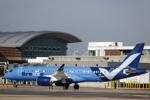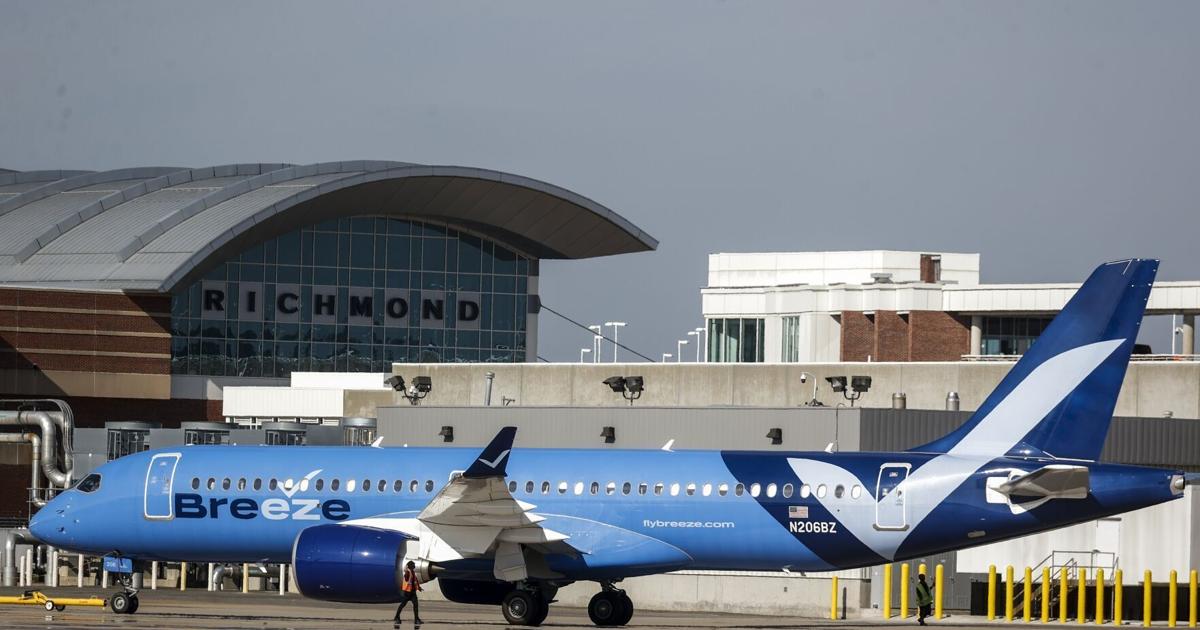Airlines using Richmond International Airport said its proposal to take over fueling and other essential services from the two private firms that have handled the services for decades would create major problems for them.
They said the takeover would mean higher prices, disruptions in service and that the airport’s estimates of how much money it would make are inflated, according to letters and emails the Times-Dispatch obtained through a Freedom of Information Act request.
“Monopoly suppliers (associated with a closed fuel facility at an airport) typically charge higher prices without transparency of costs, prevent competitive price discovery and given the lack of alternatives, hinder contingency planning,” Cathy Bucht, managing director for fuel optimization at the trade association Airlines for America said in a letter to Perry Miller, the airport president and chief executive officer.
People are also reading…

A Breeze Airways Airbus 220-300 prepares to depart on Wednesday, June 8, 2022, at Richmond International Airport.
Monopoly operations “pose airlines and airports a greater risk of flight disruption and typically fail to share critical information in the event of a fuel supply outage or off-spec shipment,” she said.
Staff are sometimes not qualified, and inventory management falls short when a monopoly handles fuel and other services, she said.
On the other hand, a system where service providers — called fixed-base operators — compete, as at the Richmond airport, “is more beneficial and appealing to airlines as it enables them to smoothly expand flight operations and meet increasing passenger demand for air travel,” she said.
Competition means transparent costs and pricing, adequate supply, sufficient inventory controls, experienced operators and updated contingency planning, she said.
Susan Kittle, manager of airport affairs for Allegiant Air, said: “We are not in favor of one fuel option as it tends to drive up costs.”
This summer, Miller proposed that the airport take over several fixed-base operator services that airlines, charter firms, corporate aircraft and private pilot pilots say are essential, ranging from fueling, de-icing and washing planes to providing lavatory, tie-down and weather and flight planning services.
In support of his proposal, Miller presented a draft financial plan that projects the commission making a gross profit of between $11.9 million and $17.8 million on fuel sales in 2026, rising to between $17.4 million and $26 million in 2035. Revenue from other services would exceed $1 million a year.
Richmond airport delays action on services takeover plan
The airport’s two current fixed-base operators, Richmond Jet Center, which has operated at the airport for nearly eight decades, and Million Air Richmond, along with operators from other airports and aviation consultants, said the projections were inflated and assumed higher sales prices.
“The current financials in the Pro Forma show inflated fuel revenues and lack the discussed capital investments which have skewed margins,” Andrew Higgins, manager of airport affairs for American Airlines, said in an email to Miller. He summarized a meeting of officials from several airlines serving Richmond that discussed the airport takeover proposal.
“Without accurate estimates of fueling costs and the potential of being limited to a single supplier, the airlines cannot see how fueling prices will remain competitive,” Higgins wrote.
“Airlines are already seeing supply chain issues for East Coast stations. Moving to a single fuel supplier will increase the risk of operational disruptions and limit flexibility of sourcing fuel.”
In an unsigned memo to the airport commissioners, released two months after Miller first presented the takeover proposal, airport staff wrote that only a monopoly operator could generate the money needed to build the new fixed-base operator facility the airport has been seeking. It said federal law bars private monopolies, but does allow public bodies, like the airport commission, to run monopoly fixed-base operation services.
Airport commissioners last week directed Miller to take another look at the proposal to take over fixed-base operator services and at how the services should be provided going forward, after Miller told commission board Chairman James Holland, that his proposal “has generated opposition from some Commissioners, Airport stakeholders, and the public.”
The Capital Region Airport Commission set no deadlines for the review. It told the staff that if the work takes long enough, it should negotiate extensions to the airport’s leases to its two fixed-base operators, or arrange some kind of management agreement with the firms.
Their leases expire in January 2026.
From the archives: Byrd Field

06-27-1963 (cutline): Scheduling departures and arrivals is at heart of airline’s operation. This directory of flights is at a ticker counter at Byrd Field here.

11-23-1971 (cutline): Soldiers flock to ticket counters at Byrd Field to arrange air transportation for furloughs

4-2-1950: Byrd Field dedication

03-23-1950: New terminal at Byrd Field set to open April 1.

12-29-1968 (cutline): Passengers wait in lobby at Byrd Field for outgoing flights.

12-4-1949 (cutline): John J. Bannister, Tommy Brown and Lester G. Woodahl, day shift in control tower, work as a team in directing approach and landing operations at Richmond’s airport.

04-29-1969 (cutline): Miniskirts, souvenirs arrive with travelers at Byrd Field. European holiday ends as jet passengers return to Richmond.

11-1-1965 (cutline): Mayor Crowe cuts a ribbon, marking the inauguration of Eastern Airlines’ jet passenger service from Byrd Field to New York. Holding the ribbon are Capt. R.D. Yler, pilot for the flight, and stewardess Margaret McLaughlin.

